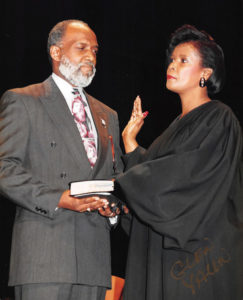She doesn’t mince words – not at home, not in her office and definitely, not on the bench. City Court Judge Earnestine Hunt Dorse has distinguished herself as a straight shooter who employs reason and judges fairly.
After an eventful and stellar career of accomplishment and success, Judge Dorse is retiring.
A reception in her honor is planned for Tuesday (January 8) at City Hall in the Hall of Mayors. For Dorse, this stage of her professional career is bittersweet. She will miss her work.
“For a judge, the measure of success is difficult,” she said. “I tried to be present in every case, and I tried to be fair. Money shouldn’t rule the day, and if you have no money, that should not affect the outcome of a case.
“I tried every day to legally and morally do right,” she told The New Tri-State Defender. “When a case is done, no matter the outcome, you want both sides to feel as if they were treated fairly, with or without money.”
Dorse never lost a re-election bid once she took the bench in 1990. A race she did lose still sticks with her.
“I tried to unseat (then Juvenile Court Judge) Kenneth Turner,” she said, “back in 1998. I knew our children weren’t being treated right. Poor families couldn’t get a fair hearing down there.”
“I heard him tell the mayor of Germantown if any of their children got into trouble, they would send them over to Germantown authorities to deal with their own,” she said. “But our children – for the very same offenses – would be processed into the system, introducing them early to a life of crime.”
Dorse ran again for Juvenile Court Judge in 2006, taking on and losing to Turner’s heir apparent, Curtis Person.
Reflecting on growing up in Memphis, she remembers the sanitation strike of 1968. Dorse was a sophomore at Melrose High School when she led a student walkout in support of the striking workers.
When Dr. Martin Luther King Jr. was gunned down on the balcony of the Lorraine Motel, Dorse had a special connection to that tragic event. Photos of the assassination aftermath show three men there with Dr. King: the Rev. Samuel Kyles, the Rev. Jesse Jackson and the Rev. Ralph Abernathy. Also on the balcony was a teenage girl, Mary Hunt, Dorse’s sister.

(Courtesy photo)
Dorse had left the Lorraine Motel prior to the shooting. Mary Hunt shared the dramatic, first-hand account of the shooting with her sister, setting the course for Dorse’s life as an agent of racial conciliation and change.
Dorse graduated Cum Laude from Clark College (now Clark Atlanta University), becoming the first in her family to receive a college degree. She was an exchange student at Dag Hammarskjold College in Columbia, Md., and studied agencies of the United Nations in five foreign countries: Switzerland (Geneva); Austria (Vienna); France (Paris); Sweden (Malmo); and Germany (Luxembourg).
In 1984, Dorse earned her Juris Doctor Degree from the University of Memphis.
She taught in the Memphis City School system, served as a research associate, worked as a paralegal and practiced law.
On December 10, 1990, Dorse was elected City Court Judge, becoming the first African-American female judge in City Courts, and the second African-American female judge in the State of Tennessee.
So, what’s next?
Dorse plans to open a boutique where she can sell her jewelry. Since a teenager, clothes design and accessories have inspired her to create original custom, pieces.
“I have enjoyed creating with my hands over the years,” said Dorse. “Whatever is next for me, it will be stress-free and filled with all the things I am driven do.
‘Also, I would love to work with the convention bureau to bring in more groups and organizations to our city. Judge Bernice Donald and I have brought legal conventions here in the past. I want to do some of those kinds of events.”
A member of Mount Pisgah CME Church, where she serves on the Steward Board, Dorse also is a member of the Zeta Phi Beta Sorority, Inc.
She is married to businessman Fred O. Dorse; they have seven children and five grandsons.


